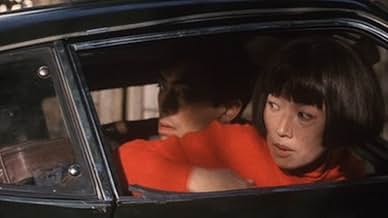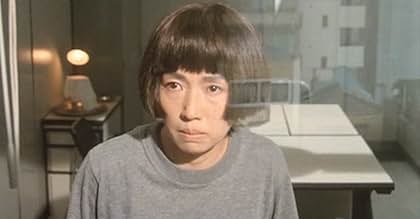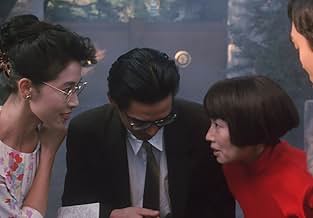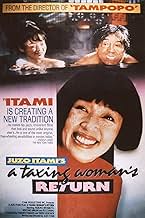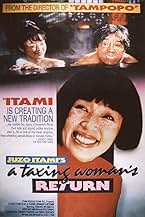Agrega una trama en tu idiomaRyoko Itakura returns as the government tax agent willing to tackle the toughest cases. This time she takes on a fanatical but lucrative religious cult run by a vile lecher.Ryoko Itakura returns as the government tax agent willing to tackle the toughest cases. This time she takes on a fanatical but lucrative religious cult run by a vile lecher.Ryoko Itakura returns as the government tax agent willing to tackle the toughest cases. This time she takes on a fanatical but lucrative religious cult run by a vile lecher.
- Dirección
- Guionista
- Elenco
- Premios
- 2 premios ganados y 4 nominaciones en total
Tarô Ishida
- Kiyohara
- (as Gentarô Ishida)
- Dirección
- Guionista
- Todo el elenco y el equipo
- Producción, taquilla y más en IMDbPro
Opiniones destacadas
This sequel to the original is about the tax inspectors in Tokyo trying to find hidden money amongst a religious group, which at the time, in the age of Jim Bakker and Jimmy Swaggert, was a very topical subject. Nobuko Miyamoto is back as Ryoko, but she is more just one in an ensemble piece rather than a big star of the film. Still, she is a great character and great fun to watch. This film has more action than the first, but it is also a little confusing. You get a major peek inside what seems like a religious cult and you see the world of greed at your doorstep. If you saw the original, which was better since it had more Ryoko, you'll want to see this also. Its a worthy follow up and its a shame there weren't more films on the subject. I saw the two films within a few days of each other and I enjoyed them. I think you will too.
This sequel to the Taxing Woman takes on the corruption of politician, religious organization, and yakuza.
Ryoko (Nobuko Miyamoto) is on to a case concerning religious organization, and gangs concerning Jiageya ( A group of gangs who buys homes by using violent means so that real estate can be rebuilt and sold for a profit ). The case eventually leads to corrupt politicians. Ryoko enters the religious organization in question as its member, and finds out that its headquarter has a hidden room containing evidence of corruption.
The movie takes into account many topics that was suspected of being the case in society back in the '80s Japan. Itami connected the dots taking artistic license and turned it into a movie.
This movie is more entertaining than the first Marusa No Onna. The corruption is on a bigger scale, and investigation is more sophisticated.
This is one of the most entertaining movie by director Itami, and is recommended for viewing.
Ryoko (Nobuko Miyamoto) is on to a case concerning religious organization, and gangs concerning Jiageya ( A group of gangs who buys homes by using violent means so that real estate can be rebuilt and sold for a profit ). The case eventually leads to corrupt politicians. Ryoko enters the religious organization in question as its member, and finds out that its headquarter has a hidden room containing evidence of corruption.
The movie takes into account many topics that was suspected of being the case in society back in the '80s Japan. Itami connected the dots taking artistic license and turned it into a movie.
This movie is more entertaining than the first Marusa No Onna. The corruption is on a bigger scale, and investigation is more sophisticated.
This is one of the most entertaining movie by director Itami, and is recommended for viewing.
I found this movie confusing in that I couldn't uniquely identify the characters. Also, the movie seems to switch gears (first it seems to be comical, then it is serious, then it is comical) and it can't seem to make up its mind about what it wants to be.
I did like some of the characters, but the movie was confusing and FAR to long.
I enjoyed Tampopo immensly but this film was dissapointing considering it was made by the same director.
Rating 4 out of 10
I did like some of the characters, but the movie was confusing and FAR to long.
I enjoyed Tampopo immensly but this film was dissapointing considering it was made by the same director.
Rating 4 out of 10
I am a big fan of Nobuko Miyamoto and her work with her husband, Juzo Itami, in such films as "Minbo" and the first "Taxing Woman" but this film dissappoints. It starts out with a great setup, a religious cult is involved with yakuza real estate dealings, but the payoff is unsatisfying. The money is difficult to keep straight, ie. who payed what to whom, and in the end I wasn't sure if the bad guys had been punished or not. Some fine moments with Miyamoto but in the end it was very forgettable.
Juzo Itami's sequel to his popular 1988 comedy has energy to spare, but there's more than a hint of redundancy in the further adventures of his intrepid, freckle-faced tax agent and her one-woman war against corporate greed. The new film is even more exaggerated than its predecessor, with enough sex, skullduggery, intrigue, and action to fuel any three James Bond thrillers, but as with most sequels the novelty is gone, and the scenario is desperately over-plotted (to say the least). Contrary to the film's title the heroine herself doesn't even return until well into the second half-hour, and then in a more limited role. What made the character so appealing in the original was her resemblance to a pint-sized Popeye Doyle (with most of the same obsessions), but here's she's reduced to being just another cog in a very stylish, very busy machine, running more or less on autopilot.
¿Sabías que…?
- ConexionesFeatured in Marusa no onnna 2 wo marusa suru (1988)
Selecciones populares
Inicia sesión para calificar y agrega a la lista de videos para obtener recomendaciones personalizadas
Detalles
- Fecha de lanzamiento
- País de origen
- Idioma
- También se conoce como
- A Taxing Woman's Return
- Productora
- Ver más créditos de la compañía en IMDbPro
Taquilla
- Total en EE. UU. y Canadá
- USD 333,584
- Tiempo de ejecución2 horas 7 minutos
- Color
- Mezcla de sonido
- Relación de aspecto
- 1.37 : 1
Contribuir a esta página
Sugiere una edición o agrega el contenido que falta

